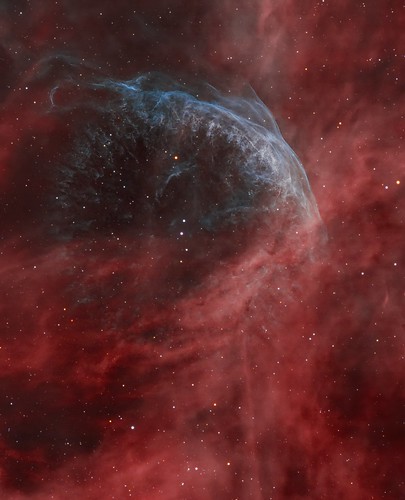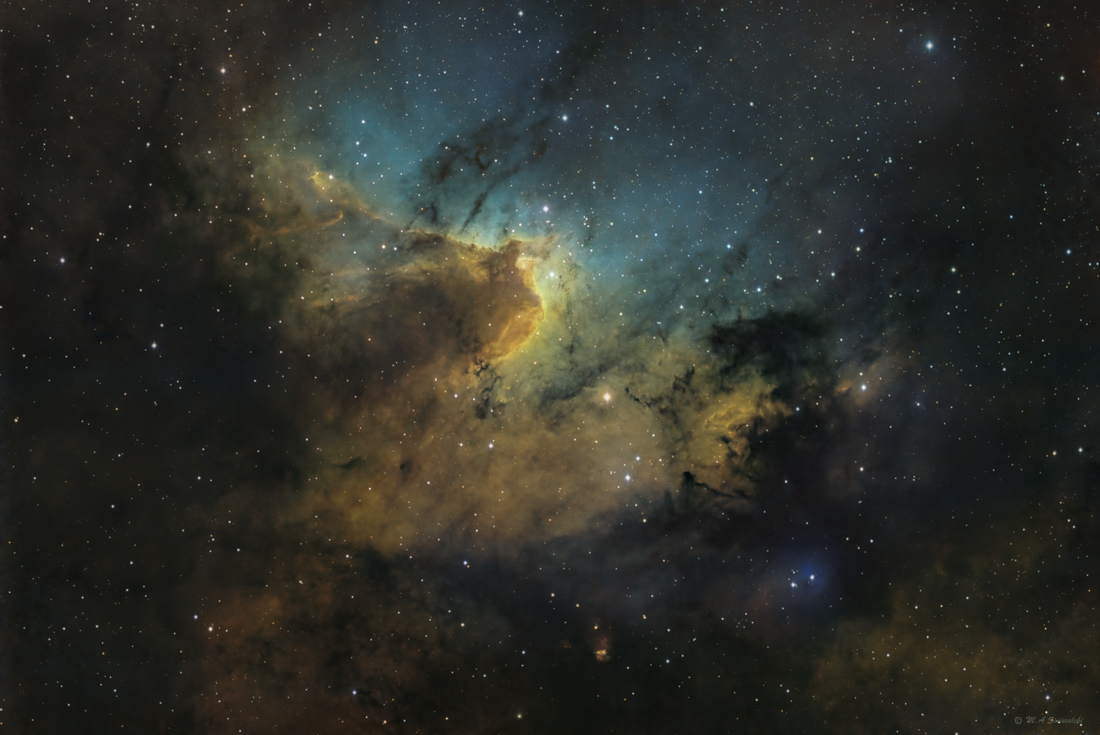Submissions: 2022 October
Submissions: 2022 October
__________________________________________________________________________________________________
Please post your images here.
Please see this thread before posting images; posting images demonstrates your agreement with
the possible uses for your image.
If hotlinking to an image, please ensure it is under 500K.
Hotlinks to images over 500K slow down the thread too much and will be disabled.
Thank you!
_________________________________________________________________________________________________
<- Previous submissions
Please post your images here.
Please see this thread before posting images; posting images demonstrates your agreement with
the possible uses for your image.
If hotlinking to an image, please ensure it is under 500K.
Hotlinks to images over 500K slow down the thread too much and will be disabled.
Thank you!
_________________________________________________________________________________________________
<- Previous submissions
Know the quiet place within your heart and touch the rainbow of possibility; be
alive to the gentle breeze of communication, and please stop being such a jerk. — Garrison Keillor
alive to the gentle breeze of communication, and please stop being such a jerk. — Garrison Keillor
IC 2574 in H-alpha and continuum ligh
IC 2574 in H-alpha and continuum light
IC 2574 (also known as Coddington's Nebula) is a very faint dwarf galaxy in Ursa Major. It is a member of the M81 group and contains very active star-forming regions showing strong H-alpha emissions.
The image is calculated with and without H-alpha information. By toggling between the two variants the correlation between HII gas clouds and bluish regions (containing young stars and probably also OIII gas) can be visualized.
Click on the animation for detailed information and full resolution pictures.
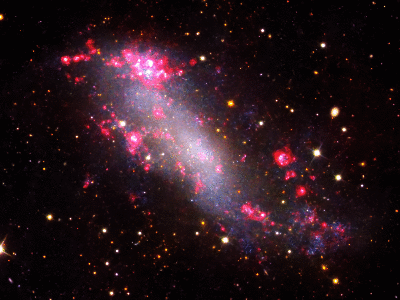
---
My Homepage
RSS news feed
IC 2574 (also known as Coddington's Nebula) is a very faint dwarf galaxy in Ursa Major. It is a member of the M81 group and contains very active star-forming regions showing strong H-alpha emissions.
The image is calculated with and without H-alpha information. By toggling between the two variants the correlation between HII gas clouds and bluish regions (containing young stars and probably also OIII gas) can be visualized.
Click on the animation for detailed information and full resolution pictures.

---
My Homepage
RSS news feed
Last edited by stefanz on Mon Oct 03, 2022 3:11 pm, edited 1 time in total.
NGC 4565 and NGC 4562 in continuum light
NGC 4565 and NGC 4562 in continuum light (final version)
NGC 4565 is a edge-on spiral galaxy in constellation Coma Berenices. Together with the smaller smaller NGC 4562 it belongs to the Coma I group.
Click on the picture for detailed information and full resolution pictures.
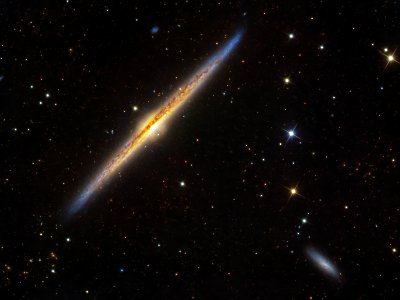
---
My Homepage
RSS news feed
NGC 4565 is a edge-on spiral galaxy in constellation Coma Berenices. Together with the smaller smaller NGC 4562 it belongs to the Coma I group.
Click on the picture for detailed information and full resolution pictures.

---
My Homepage
RSS news feed
Re: Submissions: 2022 October
Taken over 12 nights in early September, this rendering of what is traditionally known as the Elephant's Trunk nebula portrays a more ominous scene: a crocodile with its jaws agape (bottom left) and a shark (composed of various dark nebulae) diving out of an ocean of ionized oxygen gas while spewing dust into the crocodile's mouth.
Who will win this epic battle unfolding in the Cepheus constellation?
The image comprises 63.5 hours of integration (roughly equal parts of H-alpha, S2, and O3), and was taken from my backyard in Santa Monica, CA under Bortle 7 skies. Processing was done entirely in PixInsight, and the gear used was as follows:
Camera: ZWO ASI6200MM-pro
Scope: William Optics Fluorostar 132mm Refractor
Mount: Astro-Physics Mach2GTO
Filters: Chroma 3nm Ha/S2/O3 50mm
Guide Camera: ZWO ASI174MM-mini
Accessories: ZWO OAG-L, Pegasus Powerbox Advance
Full-resolution image is available at the below link.
https://www.astrobin.com/full/p17ib5/0/
https://cdn.astrobin.com/thumbs/tnoJ9TW ... UALzhf.jpg
Respectfully submitted,
Aaron Wilhelm
Who will win this epic battle unfolding in the Cepheus constellation?
The image comprises 63.5 hours of integration (roughly equal parts of H-alpha, S2, and O3), and was taken from my backyard in Santa Monica, CA under Bortle 7 skies. Processing was done entirely in PixInsight, and the gear used was as follows:
Camera: ZWO ASI6200MM-pro
Scope: William Optics Fluorostar 132mm Refractor
Mount: Astro-Physics Mach2GTO
Filters: Chroma 3nm Ha/S2/O3 50mm
Guide Camera: ZWO ASI174MM-mini
Accessories: ZWO OAG-L, Pegasus Powerbox Advance
Full-resolution image is available at the below link.
https://www.astrobin.com/full/p17ib5/0/
https://cdn.astrobin.com/thumbs/tnoJ9TW ... UALzhf.jpg
Respectfully submitted,
Aaron Wilhelm
Last edited by bystander on Mon Jan 02, 2023 12:34 am, edited 3 times in total.
Reason: Please, no hot links to images > 500 kb. Substituted smaller image.
Reason: Please, no hot links to images > 500 kb. Substituted smaller image.
-
Naztronomy
- Ensign
- Posts: 14
- Joined: Wed Feb 09, 2022 3:31 pm
Re: Submissions: 2022 October
Formerly known as the Andromeda Nebula
https://www.naztronomy.com/
Copyright: Nazmus Nasir
Higher Res can be found at https://flic.kr/p/2nQ6aYY (and https://www.naztronomy.com/images/portf ... en/M31.jpg)
Cataloged by Charles Messier as M31, The Andromeda Galaxy was originally thought to be a nebula. William Herschel believed Andromeda to be the nearest of all the great nebulae at roughly 18,000 light years.
Edwin Hubble settled the debate of M31 when he identified Cepheid Veriable stars in photos of Andromeda which allowed for a more accurate measurement of distance. He conclucded that this nebula was not in our galaxy, in fact, it was a galaxy of its own far away from our own Milky Way. Andromeda Nebula is now forever the Andromeda Galaxy.
The following image is a 2 hour exposure (84x90 secs) taken with my AT60ED and Canon T2i DSLR taken from a Bortle 5 location Northwest of Boston, MA.
Acquisition and processing video can be found here: https://youtu.be/trq6DkHueZc
https://www.naztronomy.com/
Copyright: Nazmus Nasir
Higher Res can be found at https://flic.kr/p/2nQ6aYY (and https://www.naztronomy.com/images/portf ... en/M31.jpg)
Cataloged by Charles Messier as M31, The Andromeda Galaxy was originally thought to be a nebula. William Herschel believed Andromeda to be the nearest of all the great nebulae at roughly 18,000 light years.
Edwin Hubble settled the debate of M31 when he identified Cepheid Veriable stars in photos of Andromeda which allowed for a more accurate measurement of distance. He conclucded that this nebula was not in our galaxy, in fact, it was a galaxy of its own far away from our own Milky Way. Andromeda Nebula is now forever the Andromeda Galaxy.
The following image is a 2 hour exposure (84x90 secs) taken with my AT60ED and Canon T2i DSLR taken from a Bortle 5 location Northwest of Boston, MA.
Acquisition and processing video can be found here: https://youtu.be/trq6DkHueZc
-
Guest
Re: Submissions: 2022 October
[BB Code]:
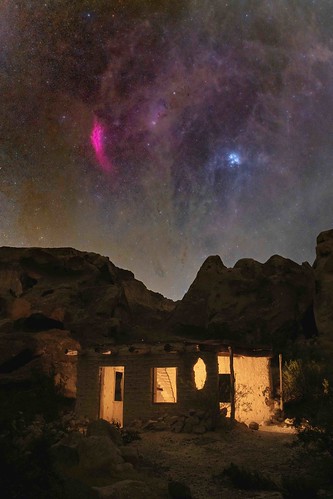 California_Pleiades_APOD-1 by Mohib Khan, on Flickr
California_Pleiades_APOD-1 by Mohib Khan, on Flickr
Copyright: Mohib Khan
Direct Flick link:: https://www.flickr.com/photos/196622240 ... ed-public/
Title: REDS and BLUES
Category: Tracked || Stacked || Blend
Social : https://www.instagram.com/fstopstills/
Website (Direct Link) : https://www.mohibkphotos.com/nightscape ... ha2ich63f4
Location: Big Bend Ranch State park
Story:
I am just amazed at how dark the skies were at the Big Bend ranch state park, a beautiful state park adjacent to the more well known Big Bend national park. The park was awarded a gold tier status by the international dark sky association. It was an hour drive to this location and driving at night, without any cell service, through the winding roads, steep cliffs and crazy speed limits was itself an adventure. I had scouted this location during the day but a place so quiet and remote unnerved me a little.
In this photo, you can see California nebula and Pleiades star cluster over an abandoned home nestled among the rocks. With skies as dark as this, extracting details between the two stellar objects was easier. The interstellar dust officially called the Taurus molecular cloud is the interstellar molecular cloud in the constellations Taurus and Auriga. This region has a number of newly formed stars and its distance from our planet at 450 light years makes it possibly the closest star forming region.
I used a light panel at the lowest setting to light the house and took 2 photos to capture the foreground, to retain highlights and capture an overall brighter image.
EXIF:
Foreground:
ISO 1250 || 40 mm || f/2.8 || 60 sec [For light inside the house]
ISO 2500 || 40 mm || f/2.8 || 120 sec [For overall brighter scene]
Sky:
[ISO 800 || 40 mm || f/2.8 || 120 sec] x 49 - Almost 1.5 hours of integration
 California_Pleiades_APOD-1 by Mohib Khan, on Flickr
California_Pleiades_APOD-1 by Mohib Khan, on FlickrCopyright: Mohib Khan
Direct Flick link:: https://www.flickr.com/photos/196622240 ... ed-public/
Title: REDS and BLUES
Category: Tracked || Stacked || Blend
Social : https://www.instagram.com/fstopstills/
Website (Direct Link) : https://www.mohibkphotos.com/nightscape ... ha2ich63f4
Location: Big Bend Ranch State park
Story:
I am just amazed at how dark the skies were at the Big Bend ranch state park, a beautiful state park adjacent to the more well known Big Bend national park. The park was awarded a gold tier status by the international dark sky association. It was an hour drive to this location and driving at night, without any cell service, through the winding roads, steep cliffs and crazy speed limits was itself an adventure. I had scouted this location during the day but a place so quiet and remote unnerved me a little.
In this photo, you can see California nebula and Pleiades star cluster over an abandoned home nestled among the rocks. With skies as dark as this, extracting details between the two stellar objects was easier. The interstellar dust officially called the Taurus molecular cloud is the interstellar molecular cloud in the constellations Taurus and Auriga. This region has a number of newly formed stars and its distance from our planet at 450 light years makes it possibly the closest star forming region.
I used a light panel at the lowest setting to light the house and took 2 photos to capture the foreground, to retain highlights and capture an overall brighter image.
EXIF:
Foreground:
ISO 1250 || 40 mm || f/2.8 || 60 sec [For light inside the house]
ISO 2500 || 40 mm || f/2.8 || 120 sec [For overall brighter scene]
Sky:
[ISO 800 || 40 mm || f/2.8 || 120 sec] x 49 - Almost 1.5 hours of integration
-
wrightdobbs
- Ensign
- Posts: 29
- Joined: Wed Jan 19, 2022 10:42 pm
Re: Submissions: 2022 October
"The Big DIpper from 30,000 ft"
Taken on a plane as I was coming back from Las Vegas, NV for a wedding. Really cool to see the Big Dipper in the morning twilight from 30,000 ft.
Captured September 21, 2022
Sony a7iii, Sigma 35mm f/1.4 lens @ f/1.4, 1/8s, ISO4000.
Credit/Copyright: Wright Dobbs
https://twitter.com/WrightDobbs
https://www.facebook.com/wrightdobbsphotography
https://instagram.com/wrightdobbs
Taken on a plane as I was coming back from Las Vegas, NV for a wedding. Really cool to see the Big Dipper in the morning twilight from 30,000 ft.
Captured September 21, 2022
Sony a7iii, Sigma 35mm f/1.4 lens @ f/1.4, 1/8s, ISO4000.
Credit/Copyright: Wright Dobbs
https://twitter.com/WrightDobbs
https://www.facebook.com/wrightdobbsphotography
https://instagram.com/wrightdobbs
Last edited by wrightdobbs on Tue Oct 04, 2022 5:54 pm, edited 1 time in total.
-
Dan Israel
NGC891 Galaxy and Abell 347 galaxy cluster, Andromeda
Hello,
Here is an image of the edge-on galaxy NGC891 in Andromeda that includes also the galaxy cluster Abell 347 in the frame.
This image was taken last Thursday night from my backyard near Paris (Bortle 7 sky, 20km from the Eiffel tower) with rather good seeing (1.8" FWHM after stacking).
I used a 8" f/4 home-made Newtonian astrograph on an Astro-Physics AP900 mount, with an ASI183mm monochrome camera and LRGB filters (4h of luminance, 1h30 with RGB filters, using 60sec subs). Processing made with Pixinsight.
 NGC891 Galaxy and Abell 347 galaxy cluster, Andromeda by Dan I, sur Flickr
NGC891 Galaxy and Abell 347 galaxy cluster, Andromeda by Dan I, sur Flickr
Here is an image of the edge-on galaxy NGC891 in Andromeda that includes also the galaxy cluster Abell 347 in the frame.
This image was taken last Thursday night from my backyard near Paris (Bortle 7 sky, 20km from the Eiffel tower) with rather good seeing (1.8" FWHM after stacking).
I used a 8" f/4 home-made Newtonian astrograph on an Astro-Physics AP900 mount, with an ASI183mm monochrome camera and LRGB filters (4h of luminance, 1h30 with RGB filters, using 60sec subs). Processing made with Pixinsight.
 NGC891 Galaxy and Abell 347 galaxy cluster, Andromeda by Dan I, sur Flickr
NGC891 Galaxy and Abell 347 galaxy cluster, Andromeda by Dan I, sur Flickr-
prashant_naik
- Ensign
- Posts: 26
- Joined: Thu Nov 07, 2019 2:26 am
Re: Submissions: 2022 October
The Pleiades (Messier 45)
 The Pleiades (Messier 45) by Prashant Naik, on Flickr
The Pleiades (Messier 45) by Prashant Naik, on Flickr
Date: Sep 23,2022
Location: Brasstown Bald, Georgia
This image was photographed using Nikon D810 mounted on a Sky watcher star adventurer tracker using Nikkor 500mm. The total exposure time is 1.6Hours plus calibration frames (20 Darks, 20 Flats and 20 Bias).
Image was stacked with calibration frames in PixInsight and final adjustments done in Photoshop CC.
Regards,
Prashant
https://www.naikonpixels.com/
 The Pleiades (Messier 45) by Prashant Naik, on Flickr
The Pleiades (Messier 45) by Prashant Naik, on FlickrDate: Sep 23,2022
Location: Brasstown Bald, Georgia
This image was photographed using Nikon D810 mounted on a Sky watcher star adventurer tracker using Nikkor 500mm. The total exposure time is 1.6Hours plus calibration frames (20 Darks, 20 Flats and 20 Bias).
Image was stacked with calibration frames in PixInsight and final adjustments done in Photoshop CC.
Regards,
Prashant
https://www.naikonpixels.com/
- Sergio
- Friendly Neighborhood Astrophotographer
- Posts: 100
- Joined: Mon Aug 29, 2011 5:26 pm
- Location: Buenos Aires, Argentina
- Contact:
Re: Submissions: 2022 October
Messier 17 Wide Field
A wide field image for a complex region covering part of the constellation of Sagittarius and Scutum. Messier 17 stands out in the center of the field. A star factory sculpted by stellar winds and radiation covering 100 light years across. Slowly stellar winds and energetic light from hot massive stars gas and dust have carved away interstellar material giving rise to the cavernous appearance and rippled shapes of the particular structure of Messier 17 also known as the Omega Nebula or the Swan Nebula.
Image with Lables and more information at
http://www.baskies.com.ar/PHOTOS/MESSIE ... AO3RGB.htm
Best Regards
Sergio
A wide field image for a complex region covering part of the constellation of Sagittarius and Scutum. Messier 17 stands out in the center of the field. A star factory sculpted by stellar winds and radiation covering 100 light years across. Slowly stellar winds and energetic light from hot massive stars gas and dust have carved away interstellar material giving rise to the cavernous appearance and rippled shapes of the particular structure of Messier 17 also known as the Omega Nebula or the Swan Nebula.
Image with Lables and more information at
http://www.baskies.com.ar/PHOTOS/MESSIE ... AO3RGB.htm
Best Regards
Sergio
-
Astrodude13
- Ensign
- Posts: 44
- Joined: Sun Jan 19, 2014 11:44 pm
Re: Submissions: 2022 October
65803 Didymos Masquerading As A Comet (Long Tail)
Technical details are as follows:
Planewave CDK24 scope
Planewave Ascension L-600
QHY 461 Mono camera
Astrodon RGB filters
Total exposure was 2.75 hours
20x300 Luminance
5x300 Red
5x300 Green
3x300 Blue
The Monochrome Luminance channel was artificially colored a very slight blue to approximate the actual color based on Hubble observations. The asteroid was placed near the first exposure's position.
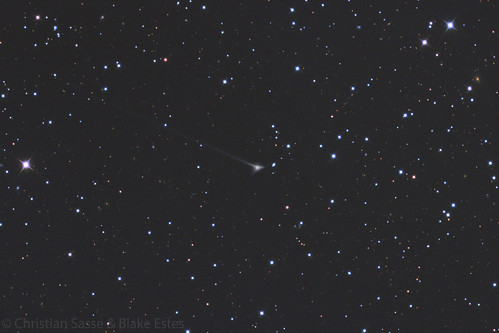 65803 Didymos by Blake Estes, on Flickr
65803 Didymos by Blake Estes, on Flickr
Technical details are as follows:
Planewave CDK24 scope
Planewave Ascension L-600
QHY 461 Mono camera
Astrodon RGB filters
Total exposure was 2.75 hours
20x300 Luminance
5x300 Red
5x300 Green
3x300 Blue
The Monochrome Luminance channel was artificially colored a very slight blue to approximate the actual color based on Hubble observations. The asteroid was placed near the first exposure's position.
 65803 Didymos by Blake Estes, on Flickr
65803 Didymos by Blake Estes, on Flickr-
paulyman astro
Re: Submissions: 2022 October
It has been raining like crazy for nearly 3 years here in Sydney, with only very occassional clear skies. Here is the Fighting Dragons of Ara, NGC6188, taken on two clear nights in early June 2022.
12x600s Ha
12x600s Oiii
12x600s Sii
ZWO 183MM
WO Star 71
CEM40
Processed in PixInsight
By Paulyman Astro (Paul Hancock)

12x600s Ha
12x600s Oiii
12x600s Sii
ZWO 183MM
WO Star 71
CEM40
Processed in PixInsight
By Paulyman Astro (Paul Hancock)

Re: Submissions: 2022 October
Here is WR 134, one of the things I suggested that was picked as a set of One Click Observations at Telescope Live on their SPA-2 setup.
This is 12x 600s on Sii, Ha, and Oiii. for a total of 6 hours with 2 hours for each channel, bin 2x2. The telescope is an Officina Stellare Pro RC 700, camera is FLI PL16083, and filters are Astrodon 3nm SHO.
I processed this in APP and Photoshop. I used all three channels in SHO with a modified Hubble Palette to set the stars as close to RGB as I could, then I used HOO for the nebula portions and combined them to get this. Image credit would be Scotty Bishop (me) and Telescope Live since the data is from them.
 WR134 by Scotty Bishop, on Flickr
WR134 by Scotty Bishop, on Flickr
Full size is here:
This is 12x 600s on Sii, Ha, and Oiii. for a total of 6 hours with 2 hours for each channel, bin 2x2. The telescope is an Officina Stellare Pro RC 700, camera is FLI PL16083, and filters are Astrodon 3nm SHO.
I processed this in APP and Photoshop. I used all three channels in SHO with a modified Hubble Palette to set the stars as close to RGB as I could, then I used HOO for the nebula portions and combined them to get this. Image credit would be Scotty Bishop (me) and Telescope Live since the data is from them.
 WR134 by Scotty Bishop, on Flickr
WR134 by Scotty Bishop, on FlickrFull size is here:

Re: Submissions: 2022 October
Here is Comet C/2017 K2 from July 24th, 2020. It appears to be flying through cosmic dust and clouds of hydrogen alpha, but that is an illusion since all of that is incredibly far away from our solar system.
This was from the Telescope Live CHI-5 setup, which is a Nikon 200mm f/2 lens and an FLI ML 16200 with Astrodon LRGB filters used in this shot. I processed it in Astro Pixel Processor and Photoshop.It consists of 5x 180s each of LRGB for a total of 15 minutes per channel or a total of an hour. Comets visibly move over long exposures so that explains the short duration used here.
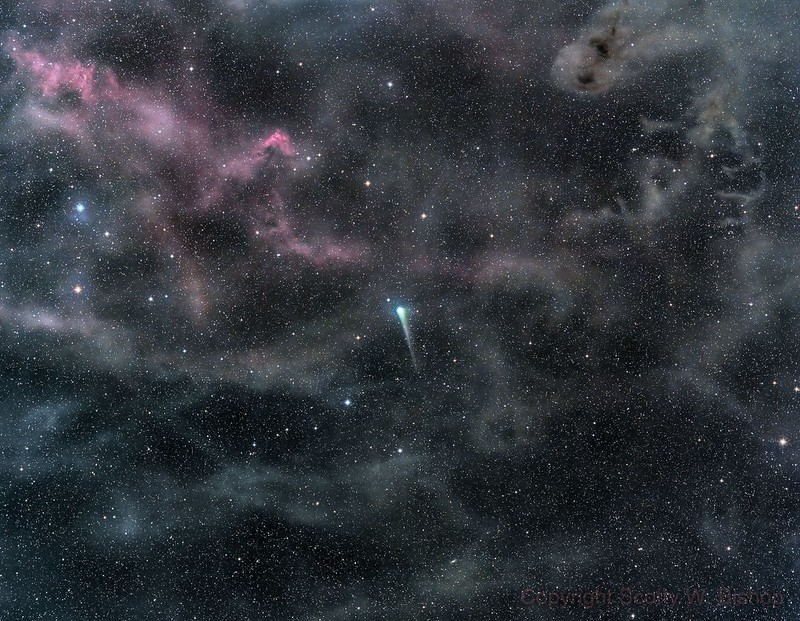 C 2017 K2 7-24-2022 by Scotty Bishop, on Flickr
C 2017 K2 7-24-2022 by Scotty Bishop, on Flickr
Full size is here:
This was from the Telescope Live CHI-5 setup, which is a Nikon 200mm f/2 lens and an FLI ML 16200 with Astrodon LRGB filters used in this shot. I processed it in Astro Pixel Processor and Photoshop.It consists of 5x 180s each of LRGB for a total of 15 minutes per channel or a total of an hour. Comets visibly move over long exposures so that explains the short duration used here.
 C 2017 K2 7-24-2022 by Scotty Bishop, on Flickr
C 2017 K2 7-24-2022 by Scotty Bishop, on FlickrFull size is here:

-
galaxycalls
- Asternaut
- Posts: 7
- Joined: Tue Sep 13, 2022 3:57 pm
Re: Submissions: 2022 October
52 hours of Andromeda Galaxy (M31)
Please find attached my image for consideration for APOD, Facebook Sky, or Instagram “Universe View Screen.”
Software used Astropixel Processor, Adobe Photoshop CC, Adobe Lightroom.
This concludes my Andromeda project for this year. I have been photographing our neighbor galaxy with my telescope the month of September 2022.
This image is 12 hours of Luminance, 11 hours of RGB, 8 hours of color, 21 hours of Ha data. Totaling 52 hours.
Tech Specs
Telescope: Takahashi FSQ85
Mount: Skywatcher Eq6r pro
Controller: ASIAIR plus
Main camera: ZWO ASI 2600MM & MC Pro
Guidecam: ZWO ASI120MC
Filters: Chroma 3nm Ha, Luminance + OSC & RGB
Location: Backyard, Bortle 4, NE USA
Total integration: 52 hours
Thanks for considering ,
Gil Ching
Instagram @galaxycalls
https://adobe.ly/3fDxjJJ
Please find attached my image for consideration for APOD, Facebook Sky, or Instagram “Universe View Screen.”
Software used Astropixel Processor, Adobe Photoshop CC, Adobe Lightroom.
This concludes my Andromeda project for this year. I have been photographing our neighbor galaxy with my telescope the month of September 2022.
This image is 12 hours of Luminance, 11 hours of RGB, 8 hours of color, 21 hours of Ha data. Totaling 52 hours.
Tech Specs
Telescope: Takahashi FSQ85
Mount: Skywatcher Eq6r pro
Controller: ASIAIR plus
Main camera: ZWO ASI 2600MM & MC Pro
Guidecam: ZWO ASI120MC
Filters: Chroma 3nm Ha, Luminance + OSC & RGB
Location: Backyard, Bortle 4, NE USA
Total integration: 52 hours
Thanks for considering ,
Gil Ching
Instagram @galaxycalls
https://adobe.ly/3fDxjJJ
Re: Submissions: 2022 October
International Observe the Moon Night form Egypt
We observed the moon at our special sites from the Pyramids of Giza and the Sphinx Oct 1st 2022
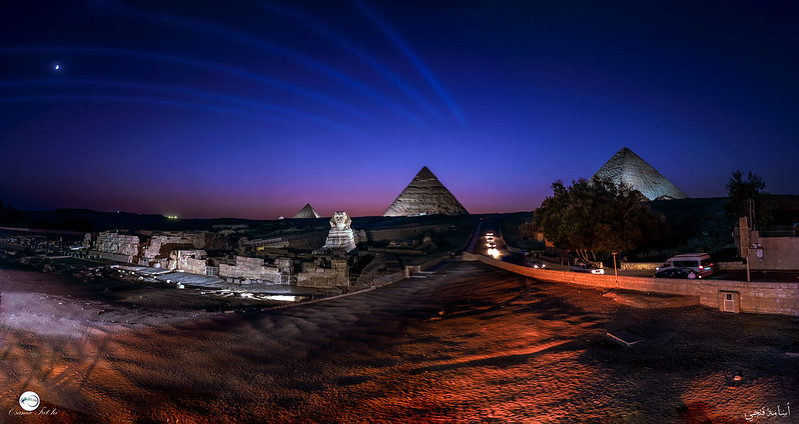 3-Pyramid-and-Sphinx-Pano-with-Moon2 by osama Fathi, on Flickr
3-Pyramid-and-Sphinx-Pano-with-Moon2 by osama Fathi, on Flickr
3-The great pyramid, the Pyramid of Khafre, the pyramid of Menkuare and the Sphinx
Image3-Pyramid-and-Sphinx-Pano-with-Moon2 by osama Fathi, on Flickr
Gears:
Nikon Z6
Nikkor 14_24mm
Exif:
Panorama of 7 photos one raw , 7 panels , 1/ 15 sec, Iso 640, f 2.8 at 24 mm
Credit
Osama Fathi
Social:
https://www.instagram.com/osama.fathi.nswatcher85/
https://www.facebook.com/NSWatcher/
note: Repost, the another one is in September' submissions
We observed the moon at our special sites from the Pyramids of Giza and the Sphinx Oct 1st 2022
 3-Pyramid-and-Sphinx-Pano-with-Moon2 by osama Fathi, on Flickr
3-Pyramid-and-Sphinx-Pano-with-Moon2 by osama Fathi, on Flickr3-The great pyramid, the Pyramid of Khafre, the pyramid of Menkuare and the Sphinx
Image3-Pyramid-and-Sphinx-Pano-with-Moon2 by osama Fathi, on Flickr
Gears:
Nikon Z6
Nikkor 14_24mm
Exif:
Panorama of 7 photos one raw , 7 panels , 1/ 15 sec, Iso 640, f 2.8 at 24 mm
Credit
Osama Fathi
Social:
https://www.instagram.com/osama.fathi.nswatcher85/
https://www.facebook.com/NSWatcher/
note: Repost, the another one is in September' submissions
-
barretosmed
- Science Officer
- Posts: 484
- Joined: Thu Oct 12, 2017 6:04 pm
Re: Submissions: 2022 October
MINERAL MOON
BEST DETAILS
https://www.astrobin.com/full/gw3a4h/0/
EQUIPMENT:
ZWO ASI 6200MC COLED
Esprit 1500mm
Mount CEM120
DATE: 10/01/2021
LOCATION: Munhoz - MG - Brazil
Copyright: Fernando Oliveira de Menezes
BEST DETAILS
https://www.astrobin.com/full/gw3a4h/0/
EQUIPMENT:
ZWO ASI 6200MC COLED
Esprit 1500mm
Mount CEM120
DATE: 10/01/2021
LOCATION: Munhoz - MG - Brazil
Copyright: Fernando Oliveira de Menezes
- carlos uriarte
- Ensign
- Posts: 38
- Joined: Sun Oct 13, 2019 6:17 pm
Re: Submissions: 2022 October
Elephant Trunkage
IC1396 - 114 shots at 300 seconds each shot from my backyard with a ZWO ASI2600MC camera, William Optics GT81 telescope, and Losmandy GM811G equatorial mount taken on October 4th, 2022.
-
Mike Siniscalchi
- Ensign
- Posts: 22
- Joined: Mon Nov 01, 2010 2:27 am
- Location: Long Island, NY
- Contact:
Re: Submissions: 2022 October
SH2-155 - Cave Nebula in Cepheus
Equipment: SBIG ST10XME w/Baader 5nm Ha SII OIII filters, TMB130SS OTA, Losmandy G11 mount
Exposure times: Ha-18x5m OIII-12x10m SII-18x5m Bin 1x1 per panel
Software: Sequence Generator Pro, Astro Pixel Processor, Adobe PS
This is a 4-panel mosaic
More image details and larger sizes can be found at: http://helixgate.net/CaveNebula.html Copyright: Michael Siniscalchi
Equipment: SBIG ST10XME w/Baader 5nm Ha SII OIII filters, TMB130SS OTA, Losmandy G11 mount
Exposure times: Ha-18x5m OIII-12x10m SII-18x5m Bin 1x1 per panel
Software: Sequence Generator Pro, Astro Pixel Processor, Adobe PS
This is a 4-panel mosaic
More image details and larger sizes can be found at: http://helixgate.net/CaveNebula.html Copyright: Michael Siniscalchi
Re: Submissions: 2022 October
Hello !
I’m french and I hope that you will excuse my poor English.
This is a 5h1/2 circumpolar star trails picture compiled from a 600+ sequence of 30s exposure with my digital camera (EOS 6D Mark II) mounted on a tripod and pointing the celestial North Pole. It was made during an observation night last month, Thursday 22/09, at RAAGSO (Rencontre des Astronomes Amateurs du Grand Sud-Ouest), something like « Meeting of Astronomers from Grand South-West (of France) », a big yearly star-party (at french scale : about 100 persons), located in a camp near the little village of Ambeyrac, in the valley of Lot river, between the little towns of Cahors and Figeac. The sky of this point is quite good because it is just South of a french dark region surnamed « Triangle noir du Quercy » (Quercy’s dark triangle). Unfortunately, the sky was clear only this first night and the weather was bad the next days.
Of course there are circular star trails around Polaris but also some other right trails probably from meteors (except one that could be a satellite when I checked) and some other plane trails.
I also combined the sequence into a video clip (HD 1080p) with two parts : first a natural view (stary sky rotating) and second a trailing view (star trails drawing). It could be donwloaded directly here :
http://www.mfavret.fr/Astro24M/2022RAAG ... RAAGSO.mp4
Or from my Face Book page where there are some pictures of the star-party :
https://www.facebook.com/permalink.php? ... 436606975
Michel FAVRET
I’m french and I hope that you will excuse my poor English.
This is a 5h1/2 circumpolar star trails picture compiled from a 600+ sequence of 30s exposure with my digital camera (EOS 6D Mark II) mounted on a tripod and pointing the celestial North Pole. It was made during an observation night last month, Thursday 22/09, at RAAGSO (Rencontre des Astronomes Amateurs du Grand Sud-Ouest), something like « Meeting of Astronomers from Grand South-West (of France) », a big yearly star-party (at french scale : about 100 persons), located in a camp near the little village of Ambeyrac, in the valley of Lot river, between the little towns of Cahors and Figeac. The sky of this point is quite good because it is just South of a french dark region surnamed « Triangle noir du Quercy » (Quercy’s dark triangle). Unfortunately, the sky was clear only this first night and the weather was bad the next days.
Of course there are circular star trails around Polaris but also some other right trails probably from meteors (except one that could be a satellite when I checked) and some other plane trails.
I also combined the sequence into a video clip (HD 1080p) with two parts : first a natural view (stary sky rotating) and second a trailing view (star trails drawing). It could be donwloaded directly here :
http://www.mfavret.fr/Astro24M/2022RAAG ... RAAGSO.mp4
Or from my Face Book page where there are some pictures of the star-party :
https://www.facebook.com/permalink.php? ... 436606975
Michel FAVRET
Question Mark Nebula
NGC7822 - 162 shots at 300 seconds each in a 3 panel mosaic. Shot from my backyard with a ZWO ASI2600MC camera, William Optics GT81 telescope, and Losmandy GM811G equatorial mount taken on October 2nd, 2022.
-
Jean M Dean
- Asternaut
- Posts: 3
- Joined: Mon May 15, 2017 9:39 pm
Re: Submissions: 2022 October
IC 1396 – Sunglasses Optional
A region of emission nebulosity in the constellation of Cepheus, about 3,000 light years distant, it is hundreds of light years across with an apparent width of about ten full moons. The Elephant Trunk Nebula can be seen at 9 o’clock, which is a mix of gas and dust and a star forming region.
This was taken from the David Le Conte Astronomical Observatory in Guernsey where we are very fortunate to have Bortle 2/3 skies. It was taken between August and October on six separate nights, setting up and packing away the equipment each night.
The equipment used was a Starlight Xpress Trius 814 mono CCD with Astrodon narrowband filters (3nm for OIII and SII and 5nm for Ha), a Takahasi FS60 doublet with reducer to give a 255mm focal length, all sitting on an iOptron GEM45 equatorial mount.
It comprises 20 minute exposures as follows: 20 x Ha, 30 x OIII and 23 x SII, totalling about 24 hours integrated imaging time. They were calibrated and processed with Pixinsight and mapped to the Canada France Hawaii Telescope (CFHT) palette where Ha, OIII, SII are mapped to R, G, B channel respectively.
A region of emission nebulosity in the constellation of Cepheus, about 3,000 light years distant, it is hundreds of light years across with an apparent width of about ten full moons. The Elephant Trunk Nebula can be seen at 9 o’clock, which is a mix of gas and dust and a star forming region.
This was taken from the David Le Conte Astronomical Observatory in Guernsey where we are very fortunate to have Bortle 2/3 skies. It was taken between August and October on six separate nights, setting up and packing away the equipment each night.
The equipment used was a Starlight Xpress Trius 814 mono CCD with Astrodon narrowband filters (3nm for OIII and SII and 5nm for Ha), a Takahasi FS60 doublet with reducer to give a 255mm focal length, all sitting on an iOptron GEM45 equatorial mount.
It comprises 20 minute exposures as follows: 20 x Ha, 30 x OIII and 23 x SII, totalling about 24 hours integrated imaging time. They were calibrated and processed with Pixinsight and mapped to the Canada France Hawaii Telescope (CFHT) palette where Ha, OIII, SII are mapped to R, G, B channel respectively.
-
Robservatory
- Ensign
- Posts: 28
- Joined: Thu Jul 28, 2022 3:26 pm
Re: Submissions: 2022 October
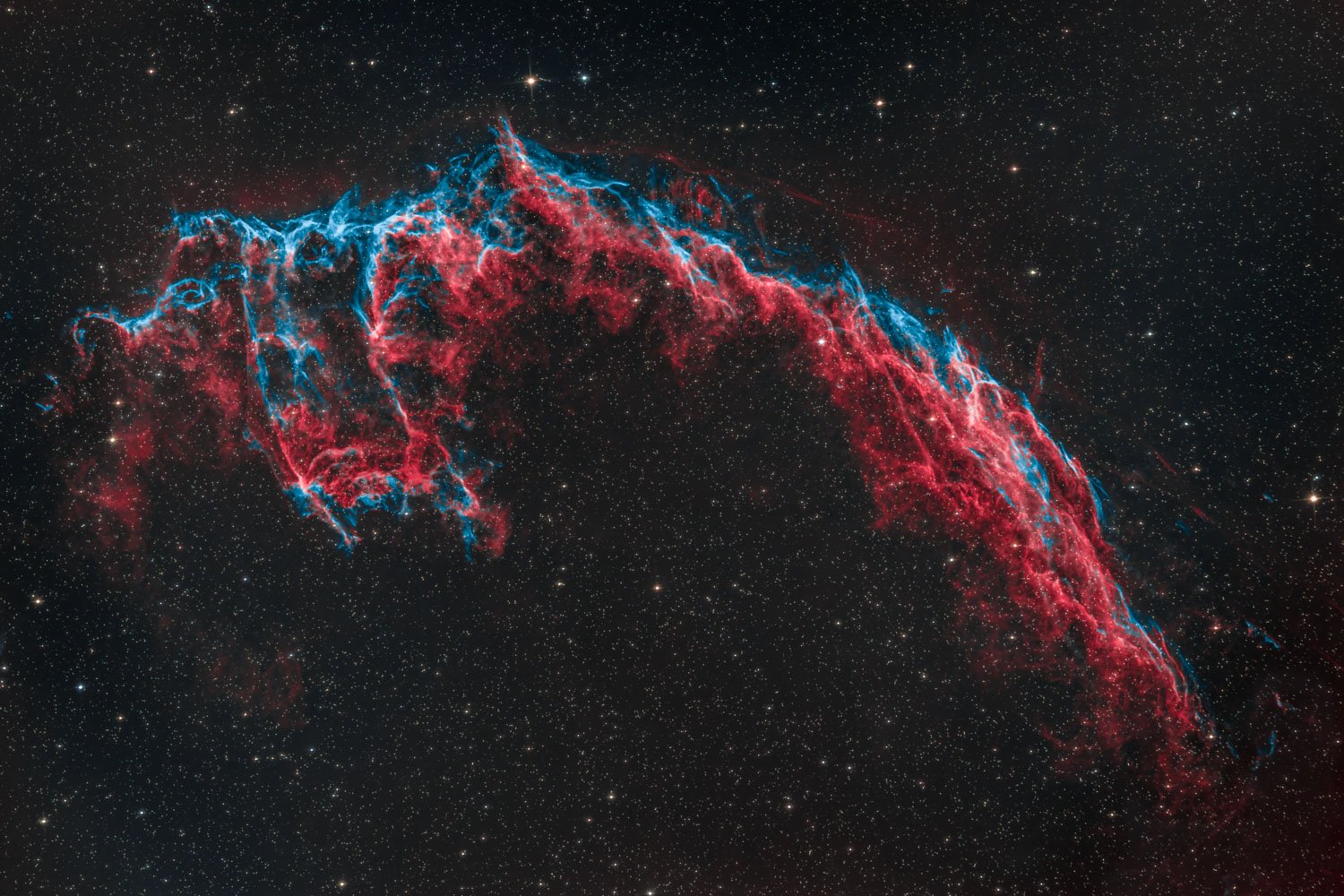
The Eastern Veil Nebula imaged over 3 nights in early October from Vancouver, Canada. This is one half of the expanding shockwave of ionized gas that is flying through space at incredible speeds as a result of a star going supernova some 15, 000 years ago.
Camera: ASI183MM Pro
Mount: ZWO AM5
Filters: Antlia 3nm Pro, LRGB V5 Pro
Software: Astro Pixel Processor, Adobe Photoshop, Adobe Lightroom.
Integration: 17 hours.

